DS Automobiles DS 7 vs Renault Symbioz - Differences and prices compared
Costs and Efficiency:
Price and efficiency are often the first things buyers look at. Here it becomes clear which model has the long-term edge – whether at the pump, the plug, or in purchase price.
Renault Symbioz has a clearly advantage in terms of price – it starts at 24400 £, while the DS Automobiles DS 7 costs 41900 £. That’s a price difference of around 17452 £.
Fuel consumption also shows a difference: DS Automobiles DS 7 manages with 1.30 L and is therefore clearly more efficient than the Renault Symbioz with 4.50 L. The difference is about 3.20 L per 100 km.
Engine and Performance:
Power, torque and acceleration are the classic benchmarks for car enthusiasts – and here, some clear differences start to show.
When it comes to engine power, the DS Automobiles DS 7 has a clearly edge – offering 360 HP compared to 158 HP. That’s roughly 202 HP more horsepower.
In acceleration from 0 to 100 km/h, the DS Automobiles DS 7 is convincingly quicker – completing the sprint in 5.70 s, while the Renault Symbioz takes 9.10 s. That’s about 3.40 s faster.
In terms of top speed, the DS Automobiles DS 7 performs noticeable better – reaching 235 km/h, while the Renault Symbioz tops out at 180 km/h. The difference is around 55 km/h.
There’s also a difference in torque: DS Automobiles DS 7 pulls convincingly stronger with 520 Nm compared to 265 Nm. That’s about 255 Nm difference.
Space and Everyday Use:
Beyond pure performance, interior space and usability matter most in daily life. This is where you see which car is more practical and versatile.
Seats: offers more seating capacity – vs .
In curb weight, Renault Symbioz is evident lighter – 1359 kg compared to 1651 kg. The difference is around 292 kg.
In terms of boot space, the Renault Symbioz offers slight more room – 576 L compared to 555 L. That’s a difference of about 21 L.
In maximum load capacity, the DS Automobiles DS 7 performs minimal better – up to 1750 L, which is about 68 L more than the Renault Symbioz.
When it comes to payload, Renault Symbioz barely noticeable takes the win – 459 kg compared to 424 kg. That’s a difference of about 35 kg.
Who wins the race?
The DS Automobiles DS 7 proves to be outperforms in nearly all aspects and therefore becomes our DriveDuel Champion!
DS Automobiles DS 7 is the better all-rounder in this comparison.
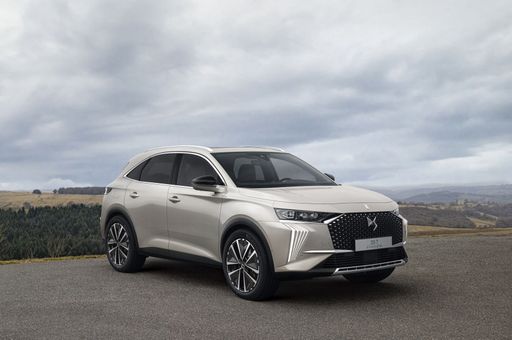 @ DS Automobiles / Stellantis Media
@ DS Automobiles / Stellantis Media
DS Automobiles DS 7
Costs and Consumption
View detailed analysis
Engine and Performance
View detailed analysis
Dimensions and Body
View detailed analysis
DS Automobiles DS 7
The DS 7 wraps Parisian elegance into SUV practicality, with sculpted surfaces, a jewel-like grille and an interior that feels more boutique lounge than family transporter. It appeals to buyers who want style and comfort without shouting, delivering a refined ride and clever tech that make daily driving feel a little more special — and yes, it’ll turn heads in the school run.
details @ DS Automobiles / Stellantis Media
@ DS Automobiles / Stellantis Media
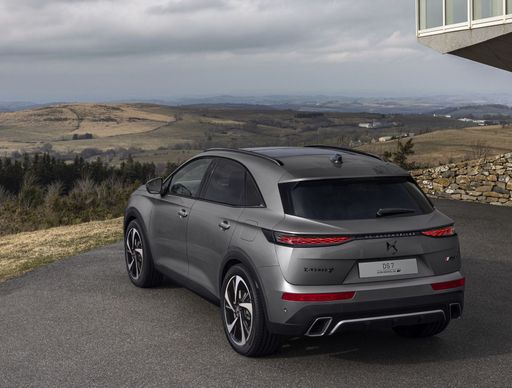 @ DS Automobiles / Stellantis Media
@ DS Automobiles / Stellantis Media
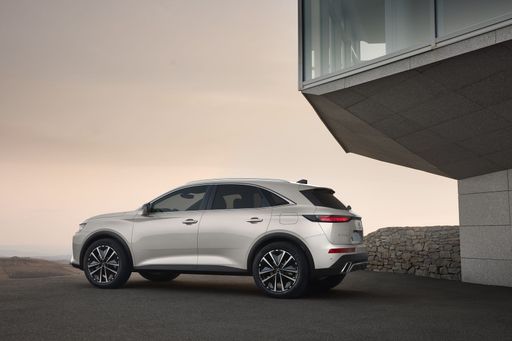 @ DS Automobiles / Stellantis Media
@ DS Automobiles / Stellantis Media
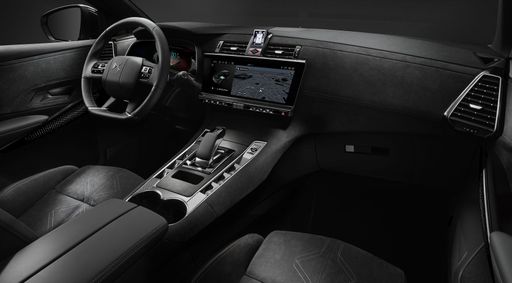 @ DS Automobiles / Stellantis Media
@ DS Automobiles / Stellantis Media
Renault Symbioz
The Renault Symbioz feels less like a traditional car and more like a rolling living room that's been told it's allowed to drive — its flowing lines and minimalist cabin are pure concept-car theatre that teases the future of everyday transport. For buyers with an eye for design and a taste for tech-forward ideas, the Symbioz is an alluring vision of what Renault could offer tomorrow, even if it's not yet a model you can park in your driveway.
details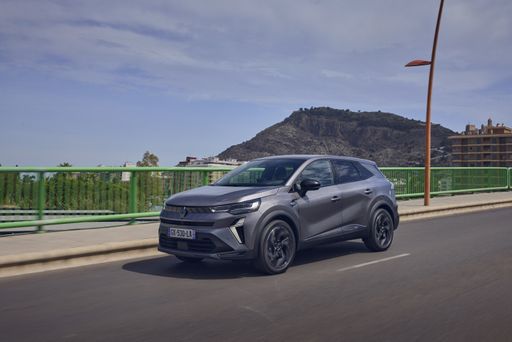 @ Renault Group Media
@ Renault Group Media
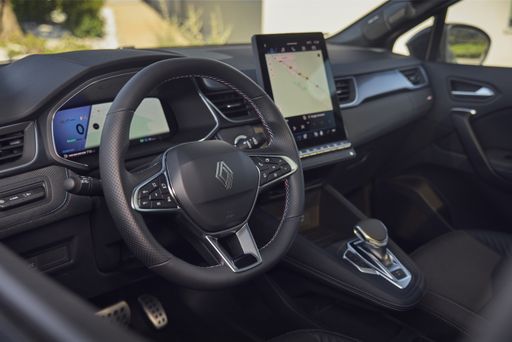 @ Renault Group Media
@ Renault Group Media
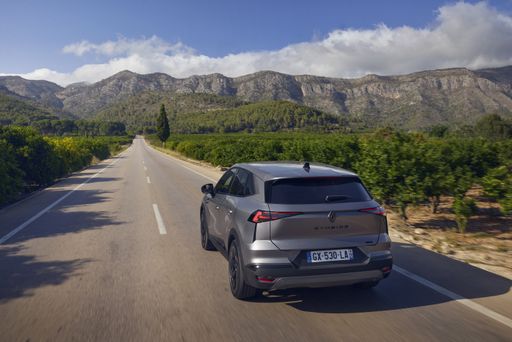 @ Renault Group Media
@ Renault Group Media
 @ DS Automobiles / Stellantis Media
@ DS Automobiles / Stellantis Media
|
 @ Renault Group Media
@ Renault Group Media
|
|
|
|
Costs and Consumption |
|
|---|---|
|
Price
41900 - 59300 £
|
Price
24400 - 30700 £
|
|
Consumption L/100km
1.3 - 5.5 L
|
Consumption L/100km
4.5 - 6 L
|
|
Consumption kWh/100km
-
|
Consumption kWh/100km
-
|
|
Electric Range
50 - 65 km
|
Electric Range
-
|
|
Battery Capacity
12.90 kWh
|
Battery Capacity
-
|
|
co2
30 - 145 g/km
|
co2
102 - 136 g/km
|
|
Fuel tank capacity
43 - 55 L
|
Fuel tank capacity
48 L
|
Dimensions and Body |
|
|---|---|
|
Body Type
SUV
|
Body Type
SUV
|
|
Seats
5
|
Seats
5
|
|
Doors
5
|
Doors
5
|
|
Curb weight
1651 - 2002 kg
|
Curb weight
1359 - 1544 kg
|
|
Trunk capacity
555 L
|
Trunk capacity
492 - 576 L
|
|
Length
4593 mm
|
Length
4413 mm
|
|
Width
1891 mm
|
Width
1797 mm
|
|
Height
1625 mm
|
Height
1575 mm
|
|
Max trunk capacity
1750 L
|
Max trunk capacity
1582 - 1682 L
|
|
Payload
398 - 424 kg
|
Payload
376 - 459 kg
|
Engine and Performance |
|
|---|---|
|
Engine Type
Diesel, Plugin Hybrid
|
Engine Type
Full Hybrid, Petrol MHEV
|
|
Transmission
Automatic
|
Transmission
Automatic, Manuel
|
|
Transmission Detail
Automatic Gearbox
|
Transmission Detail
Automatic Gearbox, Manual Gearbox, Dual-Clutch Automatic
|
|
Drive Type
Front-Wheel Drive, All-Wheel Drive
|
Drive Type
Front-Wheel Drive
|
|
Power HP
130 - 360 HP
|
Power HP
140 - 158 HP
|
|
Acceleration 0-100km/h
5.7 - 11.9 s
|
Acceleration 0-100km/h
9.1 - 11 s
|
|
Max Speed
195 - 235 km/h
|
Max Speed
180 km/h
|
|
Torque
300 - 520 Nm
|
Torque
250 - 265 Nm
|
|
Number of Cylinders
4
|
Number of Cylinders
4
|
|
Power kW
96 - 265 kW
|
Power kW
103 - 116 kW
|
|
Engine capacity
1499 - 1598 cm3
|
Engine capacity
1332 - 1789 cm3
|
General |
|
|---|---|
|
Model Year
2024 - 2025
|
Model Year
2025
|
|
CO2 Efficiency Class
E, B
|
CO2 Efficiency Class
C, D, E
|
|
Brand
DS Automobiles
|
Brand
Renault
|
What drive types are available for the DS Automobiles DS 7?
The DS Automobiles DS 7 is available as Front-Wheel Drive or All-Wheel Drive.
The prices and data displayed are estimates based on German list prices and may vary by country. This information is not legally binding.
